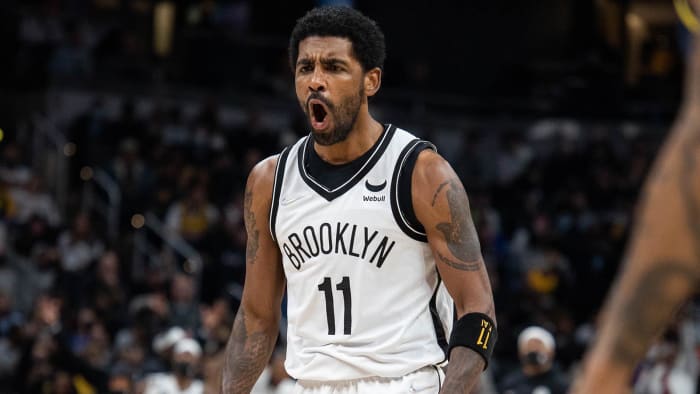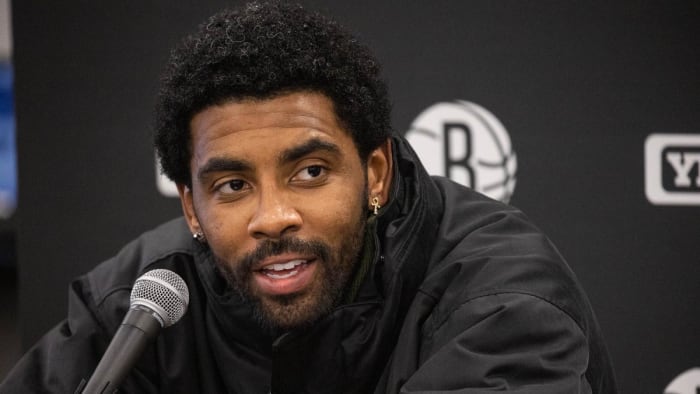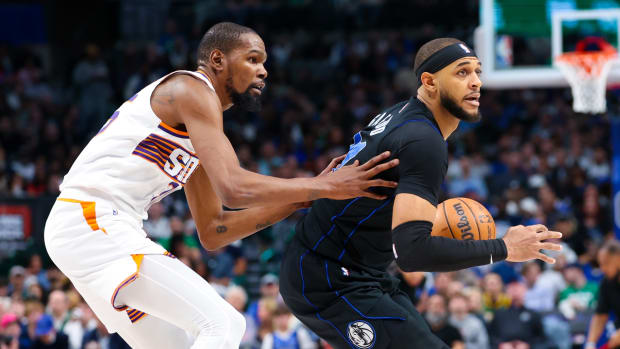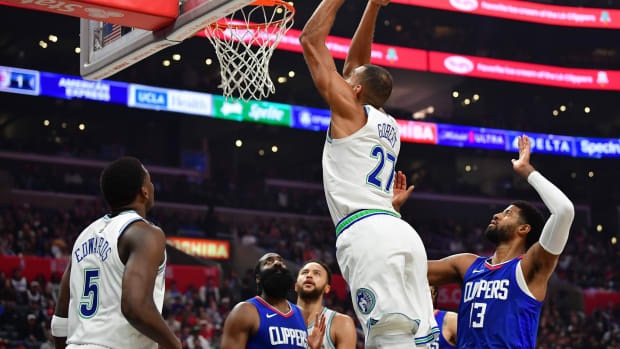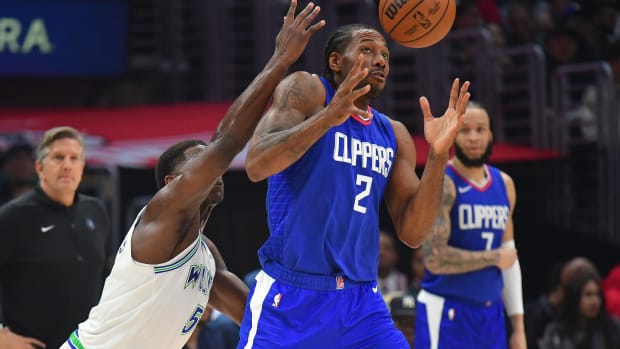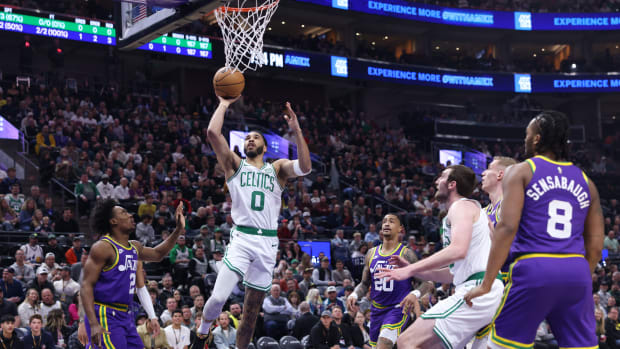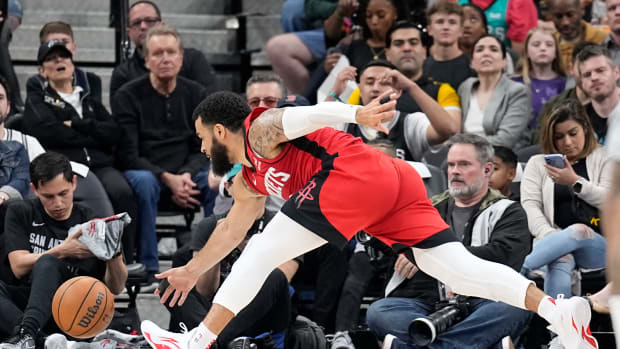'It's Unprecedented': Kyrie Irving Is Back, But Where Does That Leave the Nets?
Kyrie Irving was back on NBA hardwood Wednesday night, performing familiar feats of basketball sorcery, and it was frankly a joy to behold.
Anyone who loves the game had to delight in seeing Kyrie do Kyrie things again—the mesmerizing footwork, the bullet passes, the breezy jumpers—in his extremely belated debut for the Nets. You don’t have to be a Nets loyalist—nor a fan of Irving’s loopy philosophical ramblings and his maddening anti-vaccination stance—to appreciate the grandeur of his game. His talent spoke for itself as Irving put up 22 points in a 129-121 victory in Indiana.
“Beautiful,” teammate Kevin Durant gushed afterward.
If you are indeed a Nets fan, well, seeing Irving again flying upcourt between Durant and James Harden, after a 35-game absence, will surely stoke visions of a title run this spring…and a raucous parade down Flatbush thereafter.
But we’re a long, long way from all of that. And for all the feel-good snapshots Wednesday—Kyrie high-fiving Durant, Kyrie hugging his father in the stands, Kyrie yukking it up on the bench—the Nets’ path from here is indisputably strange, potentially rocky and wholly unprecedented.
Irving remains unvaccinated against COVID-19, and as such cannot play home games in Brooklyn—due to a New York City mandate—nor in two remaining “road” games against the Knicks, nor in a March 1 game in Toronto (due to Canada’s mandate).
So the Nets, having played their first 35 games without Irving, must now navigate a schedule in which their All-Star point guard will be a part-time participant, playing at most 21 of their final 46 regular-season games.
With every shift from home to road, and road to home, the Nets will change the starting lineup, reshuffle the rotation, reassign roles and minutes and shots. There will in effect be two Nets teams from here on out: one featuring a towering trio of superstars, the other propped up by two overworked stars and a gaggle of role players.
And if nothing changes by mid-April—if Irving remains unvaccinated, and New York leaves its law unchanged—the Nets will try to become the first team ever to win a title with an All-Star playing just half of every playoff series.
“It’s unprecedented,” says TNT analyst and former coach Stan Van Gundy, “so nobody has anything to go on with this.”
So before we get too giddy about Wednesday’s warm reunion, before we get lost in the thrills and pyrotechnics and championship odds, it’s critical to remember one thing: Kyrie Irving chose this. The uncertainty. The awkwardness. The chaos. All of it.
He chose not to take a vaccine that every one of his Nets teammates, every Nets coach, every Nets official and every Barclays Center usher took. A vaccine that at least 97 percent of all NBA players have taken. That every NBA referee, coach, general manager, scout and trainer has taken. A vaccine that more than 240 million Americans have taken. A vaccine that has proven safe and effective in either preventing or dulling the impacts of COVID-19.
And because the Nets initially (and understandably) balked at the idea of a part-time player, Irving’s choice meant the Nets were down one All-Star for their first 35 games this season. That meant a heavier burden for Durant, who is 33 years old and two years removed from an Achilles rupture and who’s now averaging nearly 37 minutes a game, his highest rate in seven years. He averaged 40 minutes a night over a 13-game stretch from late November through Jan. 1.
So with Durant and Harden overburdened, and their roster (briefly) ransacked by Covid quarantines last month, the Nets finally invited Irving back for road games—casting aside every principle they espoused in October. But that’s pro sports: Eventually, winning and talent trump everything, even public-health strictures.
If there’s one consistency to the Nets’ handling of this craziness, it’s that they’ve chosen cold pragmatism each time. In October, that meant not using Irving as a part-time player, believing it would be too disruptive. In January, in the face of a flagging rotation and exhausted stars, that meant bringing him back anyway.
“Any organization that's going to do a good job has to change as circumstances change,” Van Gundy said. “And circumstances have changed.”
Reasonable people can argue whether New York’s law is justified or fair, given that it applies to Nets and Knicks players, but not visiting teams. You can argue whether the Nets made the right call in sending Irving away. But one person can solve this mess with a single choice: Kyrie Irving.
Yet Irving still refuses to get vaccinated. If there’s a rational reason, he has yet to make it clear. (Explanations leaked by his camp have been muddled, nonsensical and contradictory.) And he refuses to acknowledge his own role in this entire conundrum.
“It’s not ideal, this situation that we’re in,” Irving said in an interview with the YES Network—as if the “situation” were something out of his control. “The odds are stacked against us,” he added—as if he couldn’t singlehandedly change those odds.
When asked about the vaccine in a later press conference, Irving indicated no change in his stance and no concern for its impact, saying simply, “I know what the consequences were. I still know what they are.”
It is Irving’s right to decline the shot. But decisions do have consequences, and his decision could very well cost the Nets their best shot at the Finals since Jason Kidd was throwing alley-oops to Kenyon Martin 20 years ago—and cost the franchise its best chance at winning its first NBA championship.
We hear endless pronouncements every year about the importance of team cohesion and consistency and culture. It’s hard to see how the Nets can claim any of that with one star playing part-time. As Van Gundy rightly notes, no NBA team can claim much consistency this season, given the scores of players going in and out of quarantine and the dozens of G-Leaguers and hardship exemptions filling nightly rosters. Yet those other teams will eventually be whole. The Nets might never be.
A lot can happen between now and the playoffs. Maybe this awful pandemic at last begins to recede. Maybe Eric Adams, New York’s new mayor, amends the law to allow Irving to play. Maybe all the controversy and awkwardness fades in the warmth of spring.
Or maybe, on a sultry Brooklyn evening in May, the Nets will take the court at a packed Barclays Center—against the Bucks or the Heat or the Bulls—and face elimination from the playoffs, while their star point guard watches from home. Because he chose to.
More NBA Coverage:
• Kyrie Irving's Uneasy Return to the Court
• LeBron at Center? Lakers Might Be On to Something
• The Warriors' Quest to Achieve What Other Dynasties Couldn't
• NBA Year In Review: The Good, Bad and Ugly































